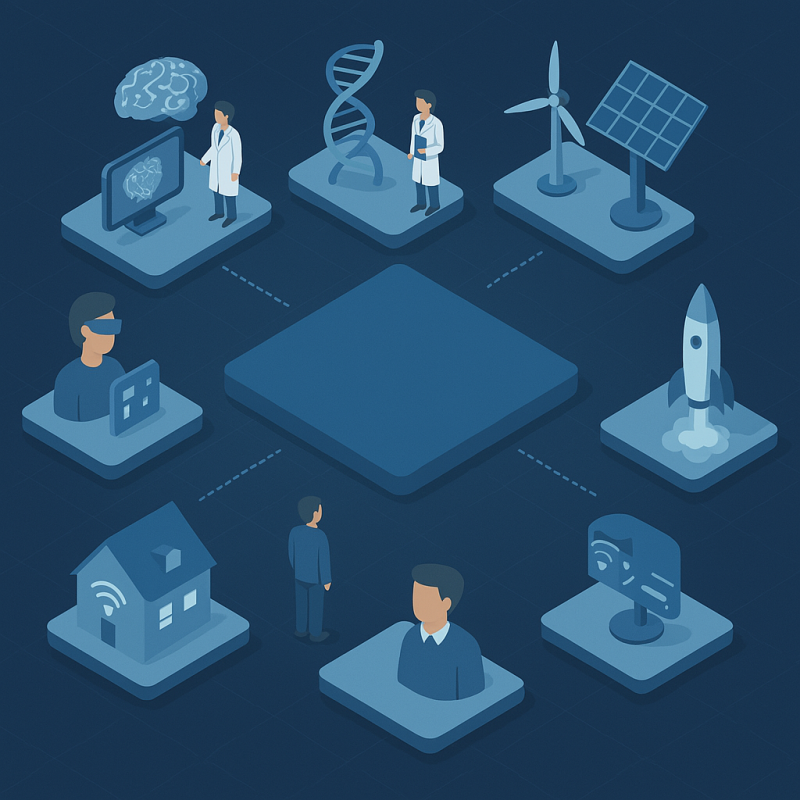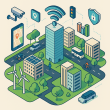Table of Contents Show
The next decade promises to be one of the most exciting and fast-moving periods in human history. From 2025 to 2035, the pace of innovation across multiple domains is expected to pick up significantly, redefining how we live, work, interact, and even perceive ourselves. Some of the changes will feel incremental, others will feel revolutionary, and a few may completely blindside us. Whether you’re an entrepreneur, student, policymaker, or just a curious individual trying to stay ahead of the curve, understanding what’s coming can help you prepare—and thrive.
Let’s dive deeper into the key areas that are poised to change the world in the next 10 years.
1. Artificial Intelligence (AI): From Tool to Partner
AI has already begun reshaping industries, but what’s coming next is more immersive and far-reaching. By 2035, AI won’t just assist with basic tasks; it’ll be a near-constant collaborator in our lives. We’ll see smarter personal assistants that anticipate our needs, AI-driven creativity in design and music, and intelligent automation that could replace entire job categories while creating new ones.
Key Predictions:
- Hyper-personalized learning in education using adaptive AI tutors.
- AI clinicians that interpret radiology scans or help diagnose diseases faster than humans.
- AI co-pilots in everything from aircraft to spreadsheets, giving humans superhuman capabilities at work.
The ethical and societal implications are vast. Governments and companies will need to build systems of accountability to avoid algorithmic bias and make AI more transparent. The AI Act passed by the European Union in 2024 is an early attempt at such regulation, but the global landscape remains fragmented.
2. Biotechnology: Redefining Health and Life Itself
Biotech is moving fast—sometimes under the radar, but always with high stakes. Gene editing tools like CRISPR have made it possible to precisely edit DNA, and in the coming decade, we’re likely to see these technologies used to cure previously untreatable diseases, reverse genetic conditions, and even slow down aging.
What to Expect:
- Gene therapies for rare and inherited diseases becoming widely available.
- Personalized medicine, where your treatment is customized based on your DNA and lifestyle.
- Lab-grown meat and cellular agriculture transforming food supply chains.
- Synthetic biology used to create microorganisms that clean oceans or fix nitrogen in soil without chemicals.
The cost of genome sequencing continues to fall. What once cost millions now costs less than $100—and that changes everything. Expect biotech to not only make us healthier but also change agriculture, pharmaceuticals, and even environmental science.
3. Renewable Energy: Clean Power Becomes Default
The global push toward decarbonization is shifting into high gear. By 2035, fossil fuels may still be in the picture, but they’ll play a much smaller role. Renewable energy—especially solar, wind, and new battery tech—will dominate electricity production in many parts of the world.
Developments to Watch:
- Perovskite solar cells that dramatically increase solar efficiency.
- Solid-state batteries that offer longer range and safer energy storage.
- Green hydrogen as a scalable solution for industrial power and shipping.
- AI-managed smart grids optimizing energy flow and reducing waste.
Electric vehicles (EVs) will likely outnumber internal combustion cars in new sales by 2030, with infrastructure catching up just in time. According to TechRadar, the EV revolution is already in motion with companies like Tesla, BYD, and Rivian leading the way.
The shift isn’t just technological—it’s political and economic. Countries rich in solar and wind resources may become the energy superpowers of tomorrow, while oil-exporting nations will be forced to diversify rapidly or risk economic collapse.
4. Quantum Computing: Opening New Dimensions
Quantum computing remains in its infancy, but by 2035, it could be poised to disrupt the very foundation of computing. These machines won’t replace our laptops or phones, but they will excel in tasks traditional computers simply can’t solve in a reasonable amount of time.
Potential Quantum Applications:
- Molecular modeling for drug discovery—identifying compounds in days instead of years.
- Supply chain optimization in global logistics networks.
- Financial modeling and risk analysis with unprecedented speed and accuracy.
- Breaking modern encryption (and replacing it with quantum-safe algorithms).
The major players—IBM, Google, Microsoft, and a slew of startups—are racing to achieve “quantum advantage,” where quantum computers outperform classical ones in useful tasks. By the late 2020s or early 2030s, we may see the first real-world applications hitting industries.
Expect major security shifts too. Encryption systems we use today for online banking and messaging may be obsolete. Governments and tech companies are already preparing for this “quantum apocalypse.”
5. Space Exploration: Humanity Goes Interplanetary
Space is no longer the exclusive domain of governments. Private companies like SpaceX, Blue Origin, and Rocket Lab are reshaping space access. Reusable rockets have slashed the cost of getting to orbit, and the next 10 years will see a flurry of lunar missions, asteroid mining experiments, and even crewed Mars preparations.
Upcoming Milestones:
- NASA’s Artemis Program aims to return humans to the Moon by the late 2020s.
- Mars mission rehearsals, with robotic cargo landers paving the way for human presence.
- Space manufacturing, where microgravity is used to produce materials impossible to create on Earth.
- Low Earth Orbit (LEO) space hotels or labs for tourism and research.
International collaboration will be key, as space traffic management, satellite regulations, and even lunar property rights come into play. The militarization of space is another wildcard—countries are developing anti-satellite weapons, and a new space race may emerge.
6. Augmented Reality (AR) & Virtual Reality (VR): Mixed Reality Takes Off
We’ve been hearing about AR/VR for years, but the next decade might finally deliver the leap we’ve been waiting for. With Apple, Meta, and other players investing heavily in XR (extended reality), expect AR glasses and immersive VR experiences to become more mainstream and less gimmicky.
Real-World Use Cases:
- Remote work and virtual meetings becoming more embodied and interactive.
- AR overlays for navigation, maintenance, or training tasks in industrial settings.
- Immersive classrooms, particularly in subjects like medicine, engineering, or history.
- Therapy and mental health treatments, where VR is used for exposure therapy, PTSD, or anxiety.
AR is also likely to become part of everyday life—shopping, tourism, gaming, and even dating apps could all be transformed. The key will be ergonomics and content: people want wearables that are comfortable and apps that are actually useful.
By 2030, it’s plausible that AR glasses will be as common as smartphones are today, marking a major shift in how we access digital information.
7. Internet of Things (IoT): The World Gets Smarter
IoT isn’t new, but it’s evolving rapidly. With more connected devices—from smart fridges to industrial robots—we’re heading toward a world where “dumb” objects are the exception, not the rule.
What This Means:
- Smart homes that anticipate your schedule, adjust energy use, and secure themselves.
- Predictive maintenance in manufacturing, preventing downtime before it happens.
- Smart cities that use sensors to manage traffic, air quality, and utilities.
- Healthcare wearables that monitor chronic conditions in real-time and share data with doctors.
The value of IoT lies in the data it generates. That data, processed by AI, leads to better decisions. But there’s a catch: security. The more devices we connect, the bigger the potential attack surface for cybercriminals.
Regulation and standardization will be needed. Expect new privacy rules and better device interoperability to become hot topics by the early 2030s.
8. Transportation: Beyond Roads and Rails
We’re on the brink of a transportation shakeup. Electric vehicles are just the start. Autonomous vehicles (AVs), drones, and even flying taxis are progressing faster than many realize.
On the Horizon:
- Driverless delivery fleets, especially for last-mile logistics.
- AI-optimized public transit using real-time data to cut wait times and fuel use.
- Urban air mobility, with air taxis or VTOL aircraft in major metros.
- High-speed rail making a comeback, especially in Asia and parts of Europe.
While technical hurdles remain, the real barriers are regulatory and infrastructural. Cities will need to redesign how they allocate space—for cars, bikes, pedestrians, and drones. Insurance and liability for AVs will be another minefield.
Still, by 2035, you may not need to own a car—or even know how to drive.
9. Education: Personalized, Global, and Lifelong
Traditional models of education are under pressure. The 9-to-3, classroom-based, exam-driven model looks increasingly outdated. In the next 10 years, education will become more flexible, continuous, and globally accessible.
Shifts to Expect:
- AI tutors guiding individual learning paths.
- Credentialing systems outside of universities, like digital badges or microdegrees.
- Immersive learning using AR/VR to simulate real-world experiences.
- Global classrooms, where students from multiple countries learn together virtually.
This change won’t be easy. Many institutions will resist. But as employers increasingly value skill over credentials, the pressure will be too great to ignore. Expect a surge in interest around lifelong learning platforms like Coursera, Udemy, and new decentralized education startups.
10. Ethics, Society, and Human Identity
With all this technology, one thing is clear: innovation will challenge our values and norms. What does it mean to be human when AI can write novels, compose symphonies, and generate deepfake videos indistinguishable from reality?
Big Questions Ahead:
- How do we define authorship, creativity, or consent in a world of digital clones?
- How do we prevent technology-driven inequality, where only the rich get access to life-extending treatments or advanced AI tools?
- Can democratic societies keep up with the pace of change, or will authoritarian models dominate?
The intersection of technology and ethics will define the coming decade. Citizens, not just developers or CEOs, will need to get involved in shaping what kind of world we want to build.
Conclusion: Innovation Is Accelerating—Are You Ready?
From 2025 to 2035, nearly every sector will be touched by innovation. Artificial intelligence, biotechnology, clean energy, quantum computing, space exploration, immersive technologies, and smart systems are converging to create a future that looks radically different from today.
But innovation isn’t destiny. It requires choices—ethical, economic, political. The technologies themselves may be neutral, but how we use them won’t be. That’s why staying informed, engaged, and adaptable is more important than ever.
If you’re looking to future-proof your skills or investments, focus on adaptability, emotional intelligence, systems thinking, and lifelong learning. The next 10 years won’t just belong to the technologists—they’ll belong to those who know how to navigate change, ethically and creatively.









